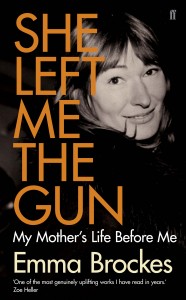Published by Faber 4 April 2013
352pp, hardcover, £16.99
Reviewed by Jessica Mann
‘One day I will tell you the story of my life and you will be amazed,’ Emma Brockes’ mother said, but she never did. So after her mother’s death Emma Brockes, a professional journalist experienced in uncovering hidden facts, decided to discover this amazing story for herself. She knew that her mother Paula had grown up in South Africa, that Paula’s own mother had died young, and her stepmother had given her seven half-brothers and sisters. A few of these relations had visited England and Emma had been told about others. She began her research in the Colindale Newspaper Library. Then she set off to South Africa on a quest. She would meet her unknown family and to try to find out what her mother had meant. Writing in the present tense, she visits or stays with several members of her mother’s large family, does research in official archives and questions friends.
Paula left South Africa when she was in her late 20s, claiming that she could not stand the political situation. Only when she was dying did Paula reveal to Emma that there had been much more personal reasons for her escape. When Paula was in her mid-20s she had gone to the authorities to accuse her father, James, of raping and molesting his daughters. He was arrested and held in prison for several months before a high court trial. In evidence given by his young daughters, incident after incident of incestuous abuse was described to the court. During a family day out the father disappeared into the bushes with one of his daughters leaving other children alone and frightened. At a birthday party the father burst into and charged across the room, grabbed one of his daughters by the hair, pinned her to the wall and put a knife to her throat, and threatening to kill her if she said anything against him.
These girls described many such traumatic moments to the court. But their father, defending himself, cross-examined his own children as they stood in the witness box and destroyed them one by one. He had even persuaded his wife to retract her statement and give perjured evidence. Paula’s brave attempt to save her younger sisters from the torment she had suffered herself did not succeed. To the horror of his children the man was acquitted. But by then they were living in a children’s home
His family did not know something that Emma was to discover in the archives: that he had served half a life sentence for killing an old man in the course of a robbery. Released early, he remained as violent, drunk and brutal as ever until he died. His malevolent legacy obviously lives on.
Having completed her pilgrimage Emma Brockes went home to England, to write a book that combines travelogue with a blow-by-blow account of an investigation and of the experience of receiving highly emotive revelations. Zoë Heller calls the book beautiful, wise and uplifting, and many readers will agree. I found it a little self-indulgent, rather like an extended version of the full page articles in the Guardian’s ‘Family’ section, confessional in style, eye-popping in detail and full of intimate revelations expertly designed to arouse the reader’s sympathy. Emma Brockes (whose job is writing for the Guardian Weekend magazine) knows exactly how to do just that.

